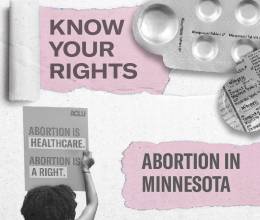
Today, on the anniversary of Roe v. Wade, we’ll be tweeting about these and other significant reproductive rights cases in Minnesota history. Follow us at @ACLUMN.
Today marks the 45th anniversary of Roe v. Wade, the landmark decision that affirmed a person’s right to make their own personal medical decisions – specifically the right to access an abortion. Yet the fight for reproductive freedom did not start or end with Roe v. Wade. Here are five pivotal reproductive rights cases in Minnesota that the ACLU was a part of. Unfortunately, the fight to protect reproductive health care is ongoing, so it’s critical that we work together to protect and advance reproductive care in 2018.
1970—DOE V. RANDALL
Three years before Roe v. Wade there was Doe v. Randall. On April 29, 1970, 23-year-old Jane Doe of St. Paul sought an abortion after experiencing a case of rubella which could cause pregnancy complications. The abortion was medically-advised but still contested. The doctor that eventually performed the procedure, Dr. Jane E. Hodgson, was involved in the push to overturn Minnesota’s anti-abortion law, which prohibited abortion unless medically necessary.
ACLU volunteer attorney, Stewart R. Perry, filed a complaint challenging the constitutionality of Minnesota's anti-abortion law. The complaint was dismissed, and on May 1970 Dr. Hodgson was indicted for the crime of providing an abortion. It was the first time in U.S. history that a licensed physician had been charged for providing a medically approved abortion. She was sentenced to 30 days in jail and a year of probation. Her conviction was later overturned.
1980—PLANNED PARENTHOOD OF MINNESOTA V. STATE OF MINNESOTA
Planned Parenthood has long provided safe, confidential and quality reproductive care. Despite the breadth of care they provide, it has always been an uphill battle for them to receive government funding. In 1980 the U.S. Court of Appeals affirmed a decision that struck down a Minnesota statute that denied government funding to certain agencies that provide abortions. The ACLU of Minnesota filed a brief in the case supporting Planned Parenthood arguing that the statute was discriminatory and motivated by a desire to punish Planned Parenthood. The statute was determined unconstitutional and successfully struck down.
Sound familiar? Threats to defund Planned Parenthood were significant in 2016 and 2017. Despite decades of challenges by anti-reproductive rights organizations and politicians, Planned Parenthood has continued to fight for reproductive care in Minnesota and across the country—and the ACLU has stood by them.
1990—HODGSON V. MINNESOTA
Pregnancy can clearly occur while you are still a minor, but many states have restrictions about when and how minors can access abortions services. The ACLU-MN and ACLU challenged a Minnesota law which required a minor to notify both biological parents before having an abortion—with no exception for parents who were divorced, who had not married, or who were unknown to the person seeking an abortion.
While the court eventually determined in 1990 that requiring notification for both parents was an unnecessary barrier to care, they upheld notification for at least one parent and a 48 hour waiting period. In addition, the court now allows minors to access what is called a judicial bypass. A minor can now petition the court to prevent their parents from being notified before getting an abortion.
1995—WOMEN OF MINNESOTA V. GOMEZ
While Roe v. Wade affirmed the right to an abortion, Congress immediately worked to undermine the U.S. Supreme Court ruling by enacting the Hyde Amendment, a rider to the federal budget that blocks federal funds from being used to pay for abortion outside of certain medical conditions. The Hyde Amendment undermines legal access to abortion—and it hurts low-income women the most.
States, on the other hand, still have the option to allow state funding for abortion services. In 1995 the ACLU filed an amicus brief challenging Minnesota state provisions that prohibited public medical assistance and general assistance funds to be used for abortion services. The Minnesota Supreme Court ruled in our favor, determining that the provision disproportionately impacted low-income women from accessing the same quality of care as others in the state of Minnesota. Minnesota is one of 15 states that cover abortion for people on the state-run medical assistance programs.
2012—WALKER V. JESSON
In Minnesota, therapeutic abortions are covered for individuals on Medical Assistance (MA) or General Assistance (GA). All abortions must fall under certain guidelines and have physician approval before they can be covered under MA or GA. In 2012, the Alliance Defense Fund sued Minnesota Department of Human Services (DHS) claiming DHS was improperly paying for abortions that are "elective," not therapeutic. They argued that because 90% of the time providers who fill out the "Medical Necessity Statement" check a box that says "the abortion is done for other health reasons," there is no real medical reason and therefore the procedures should be considered elective.
The ACLU-MN filed an amicus brief in November 2013 arguing for the case’s dismissal because a person's right to an abortion is protected by numerous court decisions both federally and at the state level. On August 5, 2014, the Minnesota Supreme Court upheld the case’s dismissal.
***
We must work to ensure that the protections offered under Roe v. Wade are available to all people across our state—including low-income people and people in rural areas. Last year at the Minnesota Capitol, we fought alongside reproductive rights activists to defend against legislation that would undermine the ability for women to make health decisions—including one banning public funding and another that would place onerous licensure requirements on clinics that provide abortion services.
To stay connected to our fight for reproductive freedom and other civil liberty issues, sign-up to receive ACLU of Minnesota action alerts. And attend our Pints & Politics event on Tuesday, February 13 to hear more about how to fight against bad reproductive bills and other ACLU priority issues during the 2018 legislative session.
References
Irons, Peter H. The Courage of Their Convictions. New York, NY: The Free Press, 1988. Print.
Garrow, David J. Liberty and Sexuality: The Right to Privacy and the Making of Roe v. Wade. Berkeley and Los Angeles, CA: University of California Press, 1994. Print.
Stewart, Jocelyn Y. “Jane Hodgson, 91: Doctor performed an abortion in 1970 to spur legal showdown.” Los Angeles Times. 31 October 2006. Accessed 20 Jan. 2018. http://articles.latimes.com/2006/oct/31/local/me-hodgson31.
U.S. Court of Appeals, Eighth Circuit. “Planned Parenthood of Minnesota v. State.” Federal Report 612 (1980): 359-363. U.S. National Library of Medicine Web. 20 Jan. 2018. https://www.ncbi.nlm.nih.gov/pubmed/11648350.
Gibson, Kate. “Could Planned Parenthood survive without federal funds?” CBS News. 6 Feb. 2017. Accessed 20 Jan. 2018. https://www.cbsnews.com/news/can-planned-parenthood-survive-without-federal-fund.
Women of the State of Minnesota v. Gomez. 542 U.S. 17. Supreme Court of Minnesota. 1995. University of Minnesota, n.d. Web. 20 Jan. 2018. http://users.soc.umn.edu/~samaha/cases/women%20of%20mn%20v%20gomez.htm.
Hodgson v. Minnesota. 497 U.S. 417. Supreme Court of the United States. 1990. Oyez, n.d. Web. 20 Jan. 2018. www.oyez.org/cases/1989/88-1125.

